List of Indiana state parks facts for kids
The state of Indiana has many amazing places called state parks! These parks are looked after by the Indiana Department of Natural Resources (DNR). There's even a special park, White River State Park, right in downtown Indianapolis. Did you know that Brown County State Park is the biggest state park in Indiana? It also gets the most visitors, followed by Indiana Dunes State Park.
How Indiana's State Parks Began
Richard Lieber was a very important person in starting Indiana's state park system. The very first state park in Indiana was McCormick's Creek State Park in 1916. Later that same year, Turkey Run State Park also became a state park.
More state parks were added steadily in the 1920s. Most of these parks were created when local towns and counties donated land to the state government. Out of the first twelve parks, only one, Muscatatuck State Park, is no longer a state park. It was given back to Jennings County in 1968.
During the Great Depression in the 1930s, many buildings and trails were built in the parks. This work was done by special government groups like the Civilian Conservation Corps and the Works Progress Administration. Many of these old buildings are still used today! Richard Lieber believed that parks should stay as natural as possible, which is why some of these improvements took a while to happen.
Changing Goals for Parks
At first, Indiana's state parks were meant to protect natural places. But over time, their purpose grew. For example, Mounds State Park was created to protect ancient Native American earthworks, which are historical. Shakamak State Park was built on an old mining site and was made just for fun activities. These parks showed that the system was changing to include more than just natural areas.
Indiana might not have as many state parks as some other states, but it has avoided having too many small properties that would be hard to manage. A goal was set to have a state park within an hour's drive for every person in Indiana. This goal was met when Prophetstown State Park was opened in 2004.
If you love looking at the night sky, you can see the Milky Way galaxy clearly at three Indiana State Parks: Shades State Park, Tippecanoe River State Park, and Turkey Run State Park.
Indiana State Parks List
| Park Name | Image | City | County or Counties | Year Established | Size (Acres) | Cool Facts |
|---|---|---|---|---|---|---|
| Brown County | 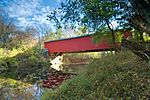 |
Nashville 39°07′N 86°16′W / 39.11°N 86.26°W |
Brown | 1929 | 15,776 acres (63.84 km2) | This is the biggest state park in Indiana! |
| Chain O' Lakes | 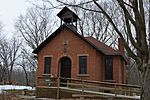 |
Albion 41°20′N 85°23′W / 41.33°N 85.38°W |
Noble | 1960 | 2,718 acres (11.00 km2) | It has eight lakes that are all connected. |
| Charlestown | 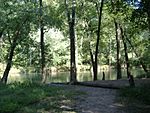 |
Charlestown 38°26′N 85°38′W / 38.43°N 85.63°W |
Clark | 1996 | 5,100 acres (21 km2) | It was built on land that used to be an army plant. |
| Clifty Falls | 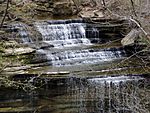 |
Madison 38°46′N 85°25′W / 38.76°N 85.42°W |
Jefferson | 1920 | 1,416 acres (5.73 km2) | Features a deep canyon where sunlight only reaches at midday. |
| Falls of the Ohio |  |
Clarksville 38°16′37″N 85°45′47″W / 38.277°N 85.763°W |
Clark | 1990 | 165 acres (0.67 km2) | You can see the Falls of the Ohio and Louisville, Kentucky from here. |
| Fort Harrison | 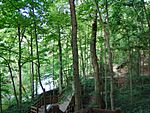 |
Indianapolis 39°52′N 86°01′W / 39.87°N 86.01°W |
Marion | 1996 | 1,700 acres (6.9 km2) | It's built where an old army fort used to be. |
| Harmonie |
|
New Harmony 38°04′N 87°57′W / 38.06°N 87.95°W |
Posey | 1966 | 3,465 acres (14.02 km2) | Close to historic villages. |
| Indiana Dunes | 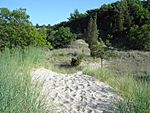 |
Porter 41°40′N 87°02′W / 41.66°N 87.04°W |
Porter | 1925 | 2,182 acres (8.83 km2) | It's next to the bigger Indiana Dunes National Park. |
| Lincoln | 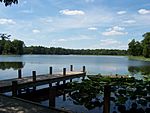 |
Lincoln City 38°06′N 87°00′W / 38.10°N 87.00°W |
Spencer | 1932 | 1,847 acres (7.47 km2) | It's across from the Lincoln Boyhood National Memorial. |
| McCormick's Creek | 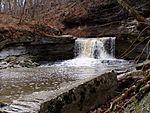 |
Spencer 39°17′N 86°44′W / 39.29°N 86.73°W |
Owen | 1916 | 1,924 acres (7.79 km2) | This was the very first state park in Indiana! |
| Mounds | 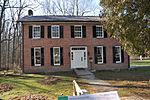 |
Anderson 40°06′N 85°37′W / 40.10°N 85.62°W |
Madison | 1930 | 290 acres (1.2 km2) | Known for its ancient earthworks built by Native Americans. |
| O'Bannon Woods | 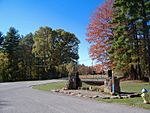 |
Corydon 38°11′N 86°17′W / 38.18°N 86.29°W |
Harrison | 2004 | 2,000 acres (8.1 km2) | Named after a former Indiana governor, Frank O'Bannon. |
| Ouabache |
|
Bluffton 40°43′N 85°07′W / 40.72°N 85.11°W |
Wells | 1962 | 1,104 acres (4.47 km2) | Its name comes from the French spelling of "Wabash." |
| Pokagon |  |
Angola 41°43′N 85°01′W / 41.71°N 85.02°W |
Steuben | 1925 | 1,260 acres (5.1 km2) | It's very popular for skiing in the winter. |
| Potato Creek |
|
North Liberty 41°33′N 86°20′W / 41.55°N 86.34°W |
St. Joseph | 1969 | 3,840 acres (15.5 km2) | |
| Prophetstown | 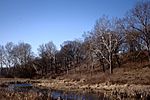 |
West Lafayette 40°30′N 86°50′W / 40.50°N 86.83°W |
Tippecanoe | 2004 | 2,000 acres (8.1 km2) | |
| Shades | 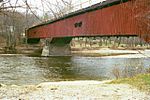 |
Waveland 39°56′N 87°05′W / 39.93°N 87.08°W |
Montgomery | 1947 | 3,082 acres (12.47 km2) | This is the only state park that ever had its own airstrip! |
| Shakamak | 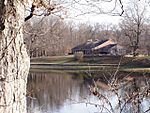 |
Jasonville 39°10′N 87°14′W / 39.17°N 87.24°W |
Clay, Greene and Sullivan | 1929 | 1,766 acres (7.15 km2) | It was built on land that used to be a strip mine. |
| Spring Mill | 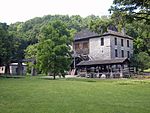 |
Mitchell 38°44′N 86°25′W / 38.73°N 86.42°W |
Lawrence | 1927 | 1,358 acres (5.50 km2) | It has an old pioneer village, many caves, and a memorial for astronaut Gus Grissom. |
| Summit Lake | 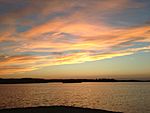 |
New Castle 40°02′N 85°18′W / 40.03°N 85.30°W |
Henry | 1988 | 2,680 acres (10.8 km2) | |
| Tippecanoe River | 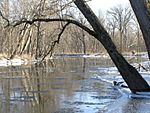 |
Winamac 41°09′N 86°36′W / 41.15°N 86.60°W |
Pulaski | 1943 | 2,761 acres (11.17 km2) | |
| Turkey Run | 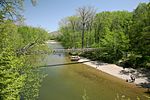 |
Marshall 39°53′N 87°13′W / 39.88°N 87.21°W |
Parke | 1916 | 2,382 acres (9.64 km2) | It's famous for its cool sandstone canyons and unique land. |
| Versailles |  |
Versailles 39°05′N 85°14′W / 39.08°N 85.23°W |
Ripley | 1943 | 5,988 acres (24.23 km2) | |
| White River | 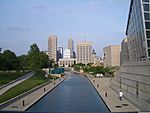 |
Indianapolis 39°46′N 86°10′W / 39.77°N 86.17°W |
Marion | 1979 | 250 acres (1.0 km2) | This is a city park right in downtown Indianapolis. |
| Whitewater Memorial | 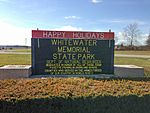 |
Liberty 39°37′N 84°58′W / 39.61°N 84.97°W |
Union | 1949 | 1,710 acres (6.9 km2) | It was built on land given by four different counties. |
See also
 | Dorothy Vaughan |
 | Charles Henry Turner |
 | Hildrus Poindexter |
 | Henry Cecil McBay |

